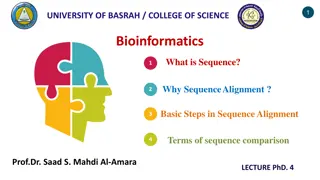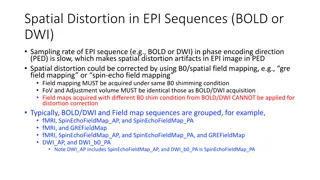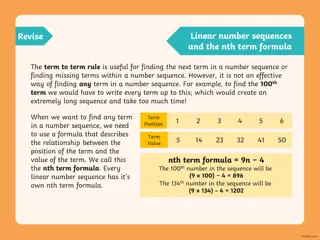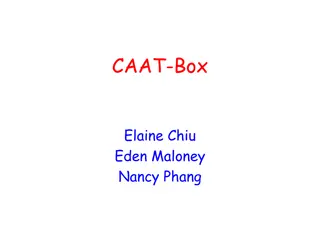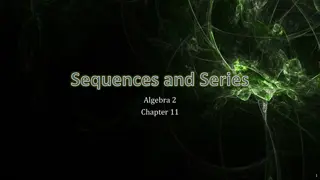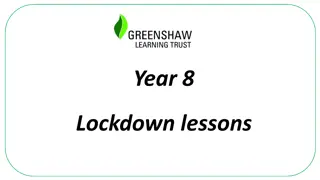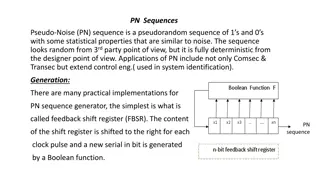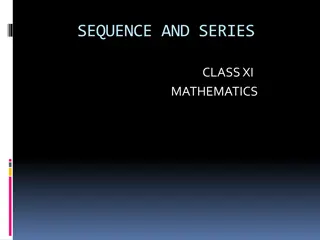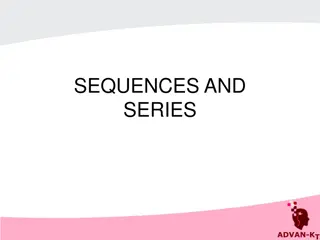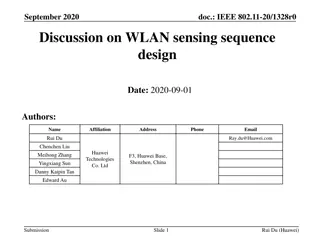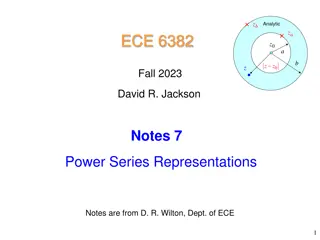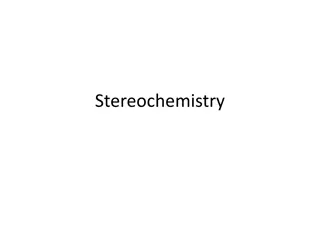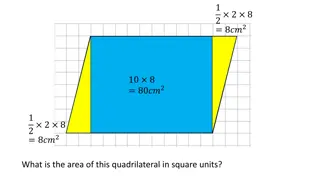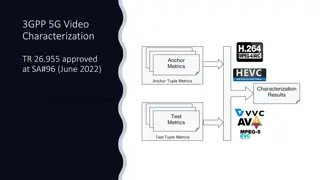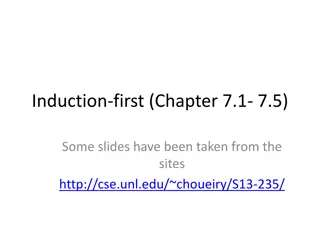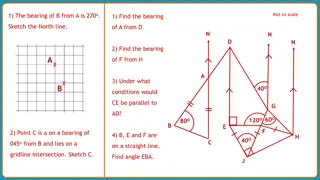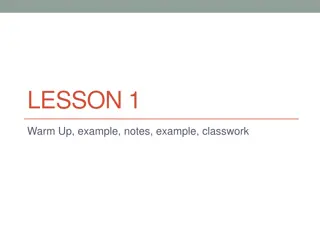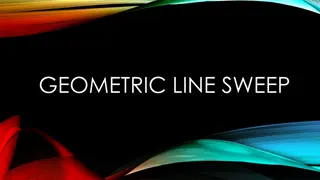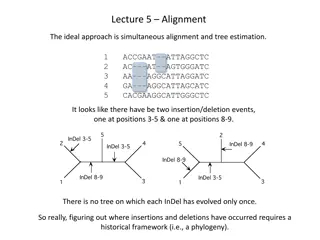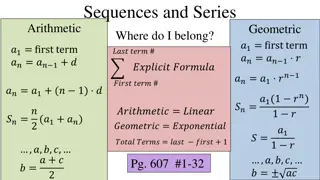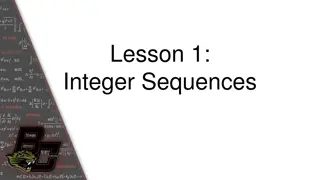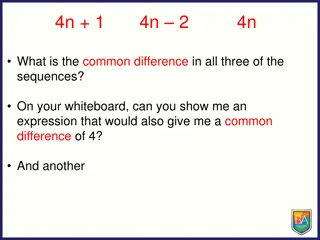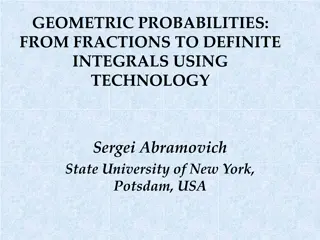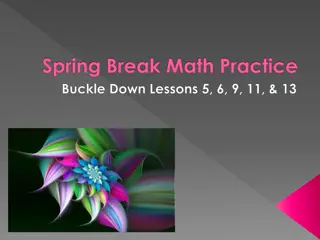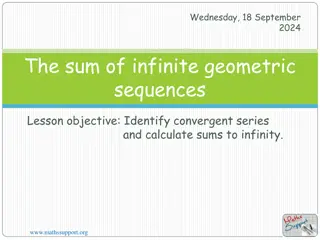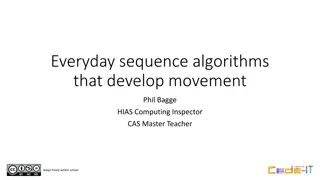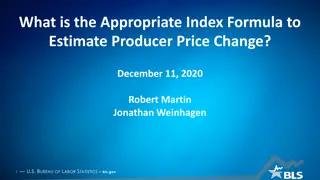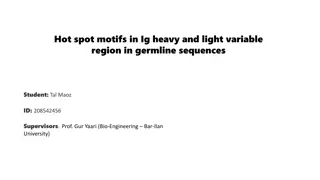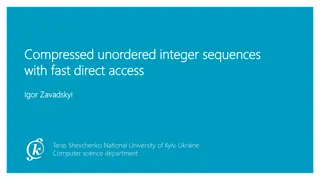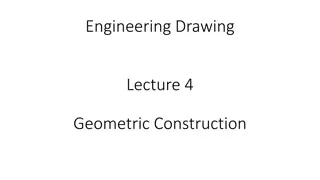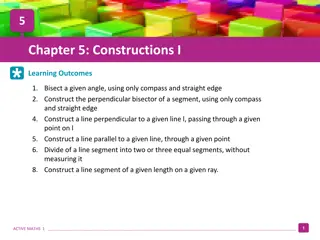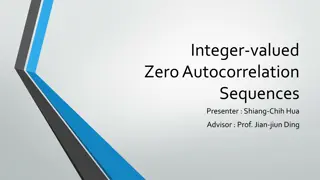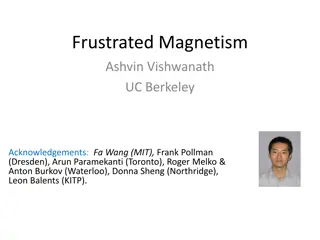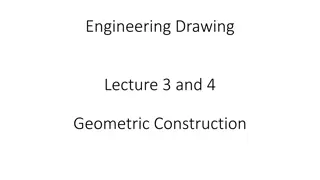Bioinformatics
Bioinformatics involves analyzing biological sequences through sequence alignment to uncover functional, structural, and evolutionary insights. This process helps in tasks like annotation of sequences, modeling protein structures, and analyzing gene expression experiments. Basic steps include compar
0 views • 6 slides
Spatial Distortion Correction in EPI Sequences: Field Mapping Examples
Spatial distortion artifacts in EPI sequences (BOLD or DWI) due to slow sampling rates in the phase encoding direction can be corrected using B0/spatial field mapping techniques. This correction requires obtaining field maps under the same B0 shimming conditions and with identical FoV and adjustment
0 views • 4 slides
Understanding Linear Number Sequences and the Nth Term Formula
In mathematics, linear number sequences can be described using the nth term formula, which helps in predicting sequences and finding specific terms without generating the entire sequence. By understanding the relationship between term positions and values, one can efficiently determine any term with
1 views • 15 slides
Understanding Transcription Factors and Regulatory Sequences in Gene Expression
Transcription factors play a crucial role in gene expression by controlling the recruitment of RNA polymerase. Promoter regions contain sequences like CAAT box and TATA box that regulate transcription by binding proteins. Consensus sequences are conserved patterns in the genome with various biologic
2 views • 10 slides
Understanding Sequences and Series in Algebra 2
Dive into the concept of sequences and series in Algebra 2 with examples and diagrams from the Big Ideas Algebra 2 textbook by Larson, R., and Boswell (2022). Explore the progression of values and patterns in sequences, and learn about the sum of series to enhance your understanding of this fundamen
1 views • 58 slides
Mastering Sequences in Mathematics
Delve into the world of mathematical sequences with this comprehensive guide. Explore what sequences are, different types like arithmetic and geometric, rules for continuing sequences, methods to find specific terms, and understanding position-to-term rules to solve for nth terms efficiently.
0 views • 17 slides
Understanding Pseudo-Noise Sequences and Applications
Pseudo-Noise (PN) sequences are deterministic yet appear random, with applications in various fields such as communication security, control engineering, and system identification. Generated using shift registers, they exhibit statistical properties akin to noise. Linear and nonlinear feedback shift
1 views • 19 slides
Understanding Sequences and Series in Mathematics
Sequences and series are fundamental concepts in mathematics, with sequences consisting of terms denoted as a1, a2, a3, ... and series involving the sum of terms in arithmetic and geometric progressions. Learn about arithmetic progression, geometric progression, terms, and formulas for finding sums
1 views • 11 slides
Understanding Sequences and Series
Exploring the concepts of sequences and series in mathematics, including definitions, examples, and exercises on arithmetic sequences, geometric progressions, and general terms. Learn about generating sequences, finding nth terms, common differences, and common ratios in different types of sequences
0 views • 20 slides
Discussion on WLAN Sensing Sequence Design in IEEE 802.11-20/1328r0
This presentation by Rui Du from Huawei discusses the design of sequences for WLAN sensing in IEEE 802.11 standards. It covers topics such as existing sequences, analysis of sequences, ambiguity functions, Golay sequences, and properties adopted for communication sequence design.
4 views • 14 slides
Geometric Series: Power Series Representations & Convergence
Geometric series analysis discusses the summation, convergence, and divergent properties within and outside the unit circle. The series' representation, convergence conditions, and extensions are explored through power series expansions and geometric series summations, providing a comprehensive unde
0 views • 50 slides
Understanding Stereochemistry: Isomers and Their Properties
Stereochemistry explores the fascinating world of isomers, including stereoisomers, geometric isomers, and structural isomers. Stereoisomers have the same molecular formula but differ in spatial arrangement, while geometric isomers lack free rotation around bonds. Structural isomers like dimethyl et
0 views • 27 slides
Geometric Problems and Solutions
Explore various geometric problems related to quadrilaterals, rectangles, parallelograms, and tangrams. Learn about finding areas, transforming shapes, and solving puzzles. Discover the principles behind turning a rectangle into a parallelogram and identifying areas of different geometric figures.
0 views • 7 slides
5G Video Characterization: Reference Sequences and Metrics
Scenarios and anchor generation for various video codecs used in 5G services are detailed, along with reference sequences for different applications like Full HD streaming, 4K-TV, screen content, and more. Tools and repositories for accessing reference sequences are provided, and metrics for evaluat
0 views • 15 slides
Understanding Sequences in Mathematics
Explore arithmetic, geometric, and Fibonacci sequences along with their general forms and properties. Learn how to define sequences and terms, and understand the concepts of indices and common differences/common ratios.
0 views • 51 slides
Solving Bearings and Geometric Problems
This content discusses solving problems involving bearings, geometric shapes, and properties of triangles and lines. It covers determining bearings between points, finding angles in isosceles triangles, and understanding parallel lines and angles. The content also includes information on angles in q
0 views • 6 slides
Sequences and Patterns in Mathematics
Dive into the world of sequences and patterns with examples and exercises involving identifying patterns, writing formulas, and graphing terms on coordinate planes. Explore different scenarios and learn to express nth terms in sequences. Understand the importance of indexing terms and using proper f
0 views • 48 slides
Interactive Role-Shifting Narrative Sequences
Explore a collection of interactive narrative sequences focusing on role-shifting scenarios, falls, and trip/fall sequences. Discover various story elements like location descriptions, object passing, outcomes, and reactions. Engage with different scenarios to enhance storytelling skills and creativ
0 views • 17 slides
Understanding Geometric Line Sweep Algorithms
Geometric Line Sweep is a powerful technique where an imaginary line sweeps over points, performing geometric operations at each point. This method can find minimum distances between points, overlapping rectangles, and more. By sorting points and efficiently processing them, it can enhance performan
0 views • 10 slides
Understanding Equivalent Ratios and Linear Sequences for Problem Solving
Learn how to identify and work with equivalent ratios, spot linear sequences, and solve problems using ratios. Practice simplifying ratios, correcting work, and applying ratios in real-life scenarios. Explore scenarios like sharing sweets between Alice and Bert to strengthen your understanding of ra
0 views • 19 slides
Progressive Alignment Overview in Phylogenetics
In the field of phylogenetics, the process of progressive alignment is crucial for aligning sequences and building evolutionary trees. This approach involves generating pairwise alignments, estimating distances, constructing guide trees, and aligning sequences progressively based on the tree. Needle
0 views • 12 slides
Exploring Sequences and Series in Mathematics
Delve into the world of sequences and series, understanding the concepts of arithmetic and geometric progressions. Learn to identify finite and infinite sequences, explore various patterns, and model them mathematically. From arithmetic to geometric, finite to infinite, this content offers a compreh
0 views • 52 slides
Geometric Routing Concepts and Byzantine Fault Tolerance
Geometric Routing enables routing without overhead, where each node knows its global coordinates and forwards messages based on proximity to the destination. Byzantine Faults pose challenges with arbitrary node behavior, but a Byzantine-Robust Geometric Routing algorithm addresses this in a 3-connec
2 views • 33 slides
Understanding Integer Sequences and Terms
Explore the concepts of integer sequences, including infinite and finite sequences, terms of a sequence, and nth term formulas. Learn to classify sequences as finite or infinite and find specific terms in a sequence. Gain a comprehensive understanding of notation and terminology used for describing
3 views • 23 slides
Exploring Juggling Patterns and Sequences
Dive into the world of juggling with a detailed exploration of basic juggling patterns and sequences. Learn about the rules and rhythms that dictate juggling movements, including cascade and fountain patterns. Discover how variations in throw heights can change the dynamics of juggling sequences. Ex
0 views • 41 slides
Exploring Sequences and Patterns in Mathematics
Dive into the world of sequences and patterns by exploring expressions, common differences, and nth terms. Discover how to create sequences with specific common differences, identify terms within sequences, and use Venn diagrams to visualize different scenarios. Uncover the rules for constructing nt
0 views • 13 slides
Exploring Geometric Probabilities: From Fractions to Integrals
Delve into the realm of geometric probabilities with insights on how to transition from fractions to definite integrals, utilizing technology for enhanced learning experiences. Understand the significance of probability calculations in quantifying likelihood, incorporating geometric representations
0 views • 26 slides
Math Practice: Ratios, Proportions, Estimation, and Geometric Figures
Explore math concepts such as ratios, proportions, estimation, rounding, and geometric figures through engaging lessons and problem-solving scenarios. Practice using proportions to find missing values, round whole numbers and decimals, estimate costs, and learn about geometric shapes. Enhance your m
0 views • 19 slides
Understanding Infinite Geometric Sequences and Convergent Series
Explore the concept of infinite geometric sequences in mathematics through the example of cutting a string into halves. Learn how to identify convergent series and calculate sums to infinity, distinguishing between convergent and divergent series based on the common ratio. Delve into the formula for
0 views • 12 slides
Understanding Geometric and Poisson Probability Distributions
Explore the geometric and Poisson probability distributions, including criteria for geometric random variables, formulas, and practical examples. Learn how to calculate probabilities using the geometric distribution and apply it in scenarios like Russian Roulette and blood donor collection. Dive int
0 views • 13 slides
Everyday Movement Sequences for Physical Computing Activities
Explore a series of everyday movement algorithms designed to enhance physical computing skills. Develop your own sequences and follow along with various movements like standing, waving, bowing, jumping, spinning, and more. From basic movements to more complex actions, adapt and freely incorporate th
0 views • 11 slides
Overview of Proposed Changes in Producer Price Index Formulas
The U.S. Bureau of Labor Statistics is considering transitioning from a modified Laspeyres formula to a geometric Young formula for elementary indexes in the Producer Price Index (PPI). This proposed change aims to enhance the accuracy and economic relevance of price measurements by utilizing a geom
0 views • 25 slides
Understanding Sequences in Database Management Systems
Sequences in a database are objects that generate unique numeric values automatically. They can be used to create primary key values and improve query performance. By defining sequences using the CREATE SEQUENCE statement in SQL, you can control the generation of sequential numbers with options like
0 views • 41 slides
Hot Spot Motifs in Ig Heavy and Light Variable Region Sequences
B cells express unique receptors to combat pathogens, with membrane-bound immunoglobulins forming their diverse repertoire. The regions of high variance, known as CDRs, play a crucial role in antigen binding. Ig genes contribute significantly to immune function, with recent studies revealing genetic
0 views • 13 slides
Advanced Compression Techniques in Unordered Integer Sequences
Presenting innovative methods for compressing and accessing unordered integer sequences efficiently. Explore fast element extraction and direct addressable variable-length codes to optimize memory usage and enhance data handling. Cutting-edge research from top universities and workshops is showcased
0 views • 8 slides
Geometric Construction and Geometrical Figures Lecture Images
Explore a series of informative images illustrating geometric construction, types of angles, triangles, and various geometric figures like squares, rectangles, rhombuses, parallelograms, and circles. Enhance your understanding of key geometric concepts with these detailed visuals.
0 views • 14 slides
Geometric Constructions: Mastering Compass and Straight Edge Techniques
Explore the art of geometric constructions using only a compass and straight edge. Learn to bisect angles, construct perpendicular bisectors, draw lines perpendicular to given lines, create parallel lines, divide line segments equally, and more. Equip yourself with the necessary skills and technique
0 views • 11 slides
Understanding Integer-Valued Zero Autocorrelation Sequences
Delve into the realm of integer-valued zero autocorrelation sequences, exploring concepts like periodic sequences, frequency domains, constant amplitudes, and more. Unravel the methods and techniques involved in creating these sequences and their significance in various applications.
0 views • 32 slides
Understanding Geometric Frustration in Magnetism and Ice
Explore the concept of geometric frustration in magnetism and ice, where energetic requirements cannot be optimized simultaneously. Learn about frustrated magnetic insulators, quantum spin liquids, and the unique properties of geometrically frustrated systems such as triangular and Kagome lattices.
0 views • 25 slides
Geometric Construction in Engineering Drawing: Lecture Highlights
Geometric construction involves creating primitive geometric forms like points, lines, and planes to define objects in space. The lecture covers the basics of 2D geometric primitives, such as points, lines, circles, and arcs. It explains the significance of points and lines in technical drawings and
0 views • 18 slides
